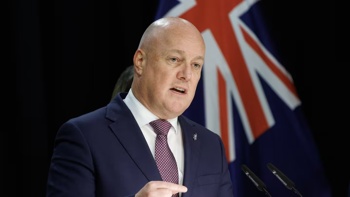
The roll-out of the Government’s controversial position on te reo Māori in the public service has been labelled “confusing as hell”, as departments take different approaches to implementing the coalition’s English first position.
New Zealand First campaigned on stripping government departments of te reo names, with Winston Peters saying at the time it was “not an attack on the Māori language – it’s an attack on the elite virtue-signallers who have hijacked language for their own socialist means”.
The position was adopted into the National / New Zealand First coalition agreement, which states the Government will “ensure all public service departments have their primary name in English” and “require the public service departments and Crown Entities to communicate primarily in English”, except for those specifically related to Māori.
After the issue was taken to Cabinet in May, Public Service Minister Nicola Willis announced an all of government directive would not be sent out, with her instead delegating the issue to each minister to manage with their own department on a case-by-case basis.
The Public Service Association’s Te Rangai Kaitakawaenga Maori or Māori national lead Marcia Puru told the Herald it’s led to an inconsistent approach across departments, with ministers from different political parties “not aligned in their thinking”.
“You’ve got Nicola Willis, Minister of Public service, saying something completely different, so we’re getting confused by the messages that are coming from the Crown, that’s not healthy for our members.”
She said PSA members have found the rules “confusing as hell”.
The approach across departments has been varied, with one ministry instructed not to use the word “Aotearoa” and another told they can use te reo “everywhere and anywhere”.
At the discretion of ministers, some departments have had to change their names from te reo to English, while others continue to operate under a te reo name.
Departments, including Health New Zealand Te Whatu Ora and the New Zealand Transport Agency Waka Kotahi, have changed their names from te reo to English first.
A NZTA spokesperson told the Herald they had received a “verbal request” from Transport Minister Simeon Brown to change its name back to the English version in line with the coalition agreement.
“With the change of Government in 2023, we took the appropriate steps to give effect to the policy of the new Government that public service organisations should have their primary name in English.”
“We have taken a staged approach to this, including changing templates, and updating our logo, with design undertaken in house to minimise costs.”
A Health NZ spokesperson said it made the change “to align with the Government’s expectation”.
But other departments, such as Oranga Tamariki and Kainga Ora, have not changed their names and remain operating under te reo names.
Oranga Tamariki said last month it “has not received any communications from ministers regarding the use of te reo Māori”.
However, Minister for Children Karen Chhour is understood to be in discussions to change the ministry’s name from Oranga Tamariki - Ministry for Children, to Ministry for Children - Oranga Tamariki. A spokesperson for Chhour’s office said this would be done “in as low-cost way as possible.”
The housing agency similarly said it had not received “any communication from the Minister of Housing regarding a potential name change”.
In a statement, Chris Bishop said “Kāinga Ora’s name is in legislation so it would require a law change. There may be legislation changes as we work through the recommendations of the independent review, and we will consider it at that time.”
Additional to the issue of name changes, departments have received differing expectations for the use of te reo in their internal and external communications.
Māori Development and Conservation Minister Tama Potaka has told the Department of Conservation it can use te reo Māori “everywhere and anywhere”.
Other ministers have taken the opposite approach, with information released under the Official Information Act showing Deputy Prime Minister Winston Peters directed the Ministry of Foreign Affairs and Trade to “refer to New Zealand, rather than Aotearoa or Aotearoa New Zealand”.
 New Zealand First, led by Winston Peters, campaigned on stripping government departments of te reo names, saying their use was virtue signalling. Photo / Mark Mitchell
New Zealand First, led by Winston Peters, campaigned on stripping government departments of te reo names, saying their use was virtue signalling. Photo / Mark Mitchell
Puru said Public Service Association members have expressed serious concern with the Government’s approach, which they see as a “racist attack”.
“We’ve done so much great work but it feels like we’re backtracking”, she said.
The issue is currently at the centre of an urgent inquiry at the Waitangi Tribunal, filed late last year by Ngāi Te Rangi whose chair claims the Government is trying to “exterminate” te reo and undo decades of progress in revitalising the Māori language.
A week of hearings concluded last month, and the tribunal is now deliberating on the issue of whether the Government’s position is, as alleged, causing significant irreversible harm to te reo Māori.
Evidence provided at the hearing included a letter from Willis to Acting Public Service Commissioner Heather Baggott, detailing her approach to the policy’s implementation.
“I have agreed with my colleagues that there is no intention to issue a directive across the Public Service relating to names or communication used by government departments,” Willis wrote.
“Individual ministers and agencies have responded to the coalition commitment on a case-by-case basis and will continue to do so. I have recommended that, when doing so, they engage in a discussion with their agencies, are very clear about their expectations, are aware of their obligations to protect and promote te reo Māori and seek advice from the commission and the Attorney-General where appropriate.”
New Zealand First, which championed the policy, is standing by its English first position.
A spokesperson for Winston Peters told the Herald in a statement the party “believes that public service departments and Crown entities must focus on clear communication when dealing with the public - which means prioritising English”.
“New Zealand First is working with government partners in fulfilling its coalition agreement commitments during this term”, the spokesperson said.
National’s approach is softer with Willis saying the Government “values te reo Māori as an official language and as a foundation for Māori culture and identity”.
“The Government believes that public services and information should be made accessible to New Zealanders with communication in language they understand. This includes the use of the most commonly understood language in New Zealand - English - as well as te reo Māori and other languages, where appropriate.”
Ethan Manera is a multimedia journalist based in Wellington. He joined NZME in 2023 and is interested in politics, local issues and the public service. Ethan is always on the lookout for a story and can be emailed at [email protected] or messaged on X (formerly Twitter) @ethanjmanera
Take your Radio, Podcasts and Music with you









